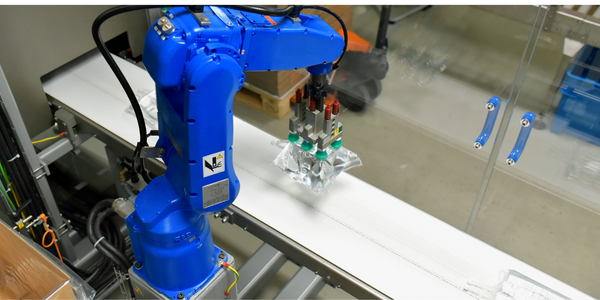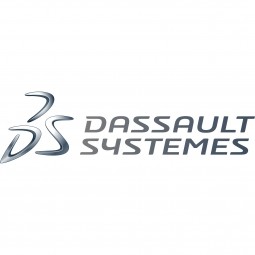Download PDF
Flow Robotics: Scaling Up Production and Accelerating Product Development with IoT

Technology Category
- Sensors - Flow Meters
- Sensors - Liquid Detection Sensors
Applicable Industries
- Equipment & Machinery
- Life Sciences
Applicable Functions
- Product Research & Development
- Quality Assurance
Use Cases
- Autonomous Robots
- Time Sensitive Networking
Services
- Cloud Planning, Design & Implementation Services
- Testing & Certification
The Challenge
Flow Robotics, a Danish manufacturer, developed flowbot™ ONE pipetting robots to alleviate the strain on bioanalysts in life-science laboratories and hospitals across Europe. These robots were designed to automate part of the testing process, speeding up the time it takes to produce results and reducing pressure on staff. However, the company faced challenges in scaling up production and accelerating product development. High workloads and physically challenging conditions have long been an issue for laboratory professionals. Flow Robotics estimates that around half of medical lab technicians carry out the same arm movements for at least a quarter of their working day. The American Society for Clinical Pathology reported that 85% of laboratory professionals feel burnt out; 36% struggle with inadequate staffing; and 32% face a heavy workload and pressure to complete all testing on time.
The Customer
Flow Robotics
About The Customer
Flow Robotics is a Danish manufacturer that develops liquid handling robots for life-science laboratories and hospitals across Europe. The company's flagship product, the flowbot™ ONE pipetting robot, is designed to automate part of the testing process in laboratories, thereby speeding up the time it takes to produce results and reducing pressure on staff. The robots are designed to reduce physically demanding pipetting tasks for laboratory personnel and minimize the risk of human error and contagion in the process. The company's mission is to disrupt the way that liquid handling is performed in life sciences companies around the world by creating workplaces where robots and people work alongside each other.
The Solution
Flow Robotics leveraged the 3DEXPERIENCE platform on cloud to scale up production of its liquid handling robots and accelerate product development. The company opted for the 3DEXPERIENCE® platform on cloud and is already achieving noticeable benefits. The platform provided a centralized communication platform to establish a common understanding, ensure everyone is working from the same data and help multiple disciplines work together. The company also partnered with Dassault Systèmes value added reseller X10D Solutions, which worked closely with the manufacturer to define its processes and implement the PLM platform. The cloud deployment allowed Flow Robotics to get up and running quickly. The company transferred all its legacy data into the 3DEXPERIENCE platform and began handling new projects natively in the platform.
Operational Impact
Quantitative Benefit
Related Case Studies.

Case Study
Smart Water Filtration Systems
Before working with Ayla Networks, Ozner was already using cloud connectivity to identify and solve water-filtration system malfunctions as well as to monitor filter cartridges for replacements.But, in June 2015, Ozner executives talked with Ayla about how the company might further improve its water systems with IoT technology. They liked what they heard from Ayla, but the executives needed to be sure that Ayla’s Agile IoT Platform provided the security and reliability Ozner required.

Case Study
IoT enabled Fleet Management with MindSphere
In view of growing competition, Gämmerler had a strong need to remain competitive via process optimization, reliability and gentle handling of printed products, even at highest press speeds. In addition, a digitalization initiative also included developing a key differentiation via data-driven services offers.

Case Study
Predictive Maintenance for Industrial Chillers
For global leaders in the industrial chiller manufacturing, reliability of the entire production process is of the utmost importance. Chillers are refrigeration systems that produce ice water to provide cooling for a process or industrial application. One of those leaders sought a way to respond to asset performance issues, even before they occur. The intelligence to guarantee maximum reliability of cooling devices is embedded (pre-alarming). A pre-alarming phase means that the cooling device still works, but symptoms may appear, telling manufacturers that a failure is likely to occur in the near future. Chillers who are not internet connected at that moment, provide little insight in this pre-alarming phase.

Case Study
Premium Appliance Producer Innovates with Internet of Everything
Sub-Zero faced the largest product launch in the company’s history:It wanted to launch 60 new products as scheduled while simultaneously opening a new “greenfield” production facility, yet still adhering to stringent quality requirements and manage issues from new supply-chain partners. A the same time, it wanted to increase staff productivity time and collaboration while reducing travel and costs.

Case Study
Integration of PLC with IoT for Bosch Rexroth
The application arises from the need to monitor and anticipate the problems of one or more machines managed by a PLC. These problems, often resulting from the accumulation over time of small discrepancies, require, when they occur, ex post technical operations maintenance.

Case Study
Robot Saves Money and Time for US Custom Molding Company
Injection Technology (Itech) is a custom molder for a variety of clients that require precision plastic parts for such products as electric meter covers, dental appliance cases and spools. With 95 employees operating 23 molding machines in a 30,000 square foot plant, Itech wanted to reduce man hours and increase efficiency.





